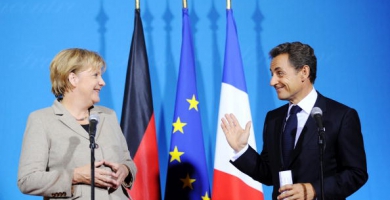| NSPM in English | |||
Remaking the Eurozone in a German Image |
 |
 |
 |
| уторак, 19. октобар 2010. | |
|
(Stratfor, October 19, 2010)
Germany and France have agreed to EU budgetary reforms that would allow some form of mandated “debt breaks” — mechanisms to sanction member states should they amass too much debt — to be submitted to the wider eurozone for adoption. While the rules will prevent the free-spending ways that allowed the Greek debt crisis to metastasize, they will also limit the ability of eurozone states less developed than Germany — practically all of them — to catch up economically with the Central European power.
Analysis French President Nicolas Sarkozy and German Chancellor Angela Merkel agreed on Oct. 18 at their summit in the French Atlantic resort town of Deauville to reform the recently ratified Lisbon Treaty to enhance eurozone fiscal rules and enforcement mechanisms. This formation of a unified Franco-German position increases the likelihood that the proposal will ultimately be submitted for adoption by the rest of the European Union at the Oct. 28-29 EU leaders’ summit in Brussels. The agreement between Merkel and Sarkozy was later in the day echoed by the eurozone finance ministers meeting in Brussels under the leadership of EU President Herman Van Rompuy. The stated goal of the agreement between France and Germany is to prevent a recurrence of the current economic crisis in Europe by pushing for a treaty change that would define specific punishments should states violate eurozone budget rules. By pushing for a change of the EU treaty, Germany is also looking to lock the rest of the eurozone into its stricter version of budgetary discipline. If passed, the new rules will in fact be to the benefit of Germany beyond enforcing discipline, however, as it will make it far more difficult for less developed eurozone economies to borrow and thus compete economically with Germany. While details of reforms will not be released until they are submitted as legislation, the following set of recommendations were brought up by Merkel, Sarkozy and the EU finance ministers on Oct. 18: · The Commission, with qualified majority voting approval from a majority of EU states, would have the power to place eurozone member states that are close to breaking the union’s fiscal rules outlawing budget deficits of more than 3 percent and public debt of more than 60 percent of gross domestic product on notice with possible sanctions. · Graduated sanctions would be imposed by forcing countries that break fiscal rules to make interest-bearing deposits that would be returned only if and when the countries comply with rules. Voting rights would ultimately be rescinded from eurozone members who egregiously violate fiscal rules. · Automatic sanctions would be imposed if countries already placed under excessive debt procedures have not taken necessary corrective measures within a six month period, unless the EU countries vote against the sanctions via qualified majority voting. · The proposed suggestions would be turned into a detailed legislative proposal in 2011 and ratified with a Lisbon Treaty revision by 2013. · The revised Lisbon Treaty would also set up permanent mechanisms, such as additional early warning mechanisms, to prevent further economic crises. By proposing these provisions, Germany agreed to water down its demand that member states breaking fiscal rules — but not necessarily yet subjected to excessive debt procedures — be placed under automatic sanctions that could only be removed via a vote by EU member states. Instead, EU member states would still retain the ability to vote whether to give the European Commission the authority to first launch an excessive budget deficit procedure against the offending eurozone member state, a concession France and a number of Mediterranean countries wanted in exchange for agreeing to reform the Treaty along the proposed lines. The sanctions do become quasi-automatic if EU states authorize the European Commission to go forward with an excessive debt procedure and the offending country does not remedy the excessive deficit within six months. In that case, only a qualified majority vote of member states or compliance will be able to halt the clearly defined, automatic sanctions, so Berlin still retained an element of what it wanted. Germany ultimately agreed to the bargain because it was Treaty reform that it wanted from the beginning, and it may have engaged in strategic overstretch, watering down the automatic sanctions aspects, to get eurozone member states to agree — in writing — to enshrining new rules in the EU Treaty. Reforming the Treaty will be a significant hurdle to reforming the fiscal rules; the Lisbon Treaty notoriously got held up by a number of countries during its ratification process, and the United Kingdom and Sweden are already making it clear that they are not in favor of Treaty reform. However, if passed the rules will become binding, introducing a German-styled “debt break” on all eurozone economies. From a purely budgetary point of view, it would force everyone to trim spending and enforce budget discipline that would ostensibly prevent further explosions of debt that have characterized the current crisis. For Germany and its fellow northern European economies — the Netherlands and Denmark in particular — the proposed adjustments would change little. However, for southern eurozone economies, a Treaty-enforced “debt break” means less capital, which they desperately need to compete with Germany. This is especially true in the context of the current increased financing costs and the divergence in borrowing rates that have seen eurozone member costs skyrocket, particularly for the so-called Club Med countries — Greece, Spain, Italy and Portugal — compared to those of Germany. Because of higher costs of funding, financing charges can quickly compound and make what was a manageable level of debt into considerably more. Herein lies the geopolitical significance of the proposed Treaty change. Germany already has the rest of the eurozone participating in a currency union that is largely to Berlin’s advantage. No country can devalue its currency to compete with German exports, while at the same time each country has pledged to remain open to German capital penetration. That said, the new eurozone rules do specifically limit public debt, not private. Although many eurozone economies, especially in the south, do count on public spending to drive a considerable portion of the economy, the argument could be made that the private sector will pick up on development where the public is unable to. Ironically, this only reinforces Germany’s position since the lack of capital controls means that it will largely be German capital that floods into the eurozone, as Germany is the closest — and most experienced in investing in the region — large capital center to the eurozone economies. In other words, the conditions will only encourage German capital to shape the development of neighboring states in a way that will benefit the German economy. The problem for the rest of the eurozone, including France, which could very much use capital to catch up to Germany’s level of advancement, is that Germany is in the driver’s seat at the moment. The European Financial Stability Fund, the 440 billion euro ($610 billion) facility that would be used to bail out any future eurozone governments, was set up as an offshore bank that does not need approval by the EU Council to be activated. Because Berlin provides the facility with most of its capital, Germany also has overwhelming say in who gets the funds and what they need to do to get them. The facility is even run by a German. And as the eurozone’s financial stability improves, the likelihood that any other members could use a systemic threat as a reason to receive aid, as it could be argued Greece did, declines. Due to Germany’s overwhelming influence and its role as Europe’s main capital provider, the rest of the eurozone therefore will likely agree to Germany’s version of the new rules — for the time being — and codify them into a Treaty. However, Germany may also be planting the seeds of the eurozone’s future trouble. No country is going to willingly place its own development and competitiveness in danger for the sake of systemic stability or Germany’s continued economic dominance. The question is therefore whether the architecture that Germany is designing will hold the eurozone together or ultimately be its downfall. |
Од истог аутора
- The Nabucco West Project Comes to an End
- Serbia: A Weimar Republic?
- NATO's Lack of a Strategic Concept
- Surveying Turkish Influence in the Western Balkans
- The Geopolitics of Turkey: Searching for More
- Kosovo – Consequences of the ICJ Opinion
- Kyrgyzstan and the Russian Resurgence
- Russia, Belarus, Kazakhstan: A Customs Deal and a Way Forward for Moscow
- Montenegro's Membership in NATO and Serbia's Position
- ЕУ: Убрзано ширење на Балкан
- The Return of Germany
Остали чланци у рубрици
- Playing With Fire in Ukraine
- Kosovo as a res extra commercium and the alchemy of colonization
- The Balkans XX years after NATO aggression: the case of the Republic of Srpska – past, present and future
- Из архиве - Remarks Before the Foreign Affairs Committee of the European Parliament
- Dysfunction in the Balkans - Can the Post-Yugoslav Settlement Survive?
- Serbia’s latest would-be savior is a modernizer, a strongman - or both
- Why the Ukraine Crisis Is the West’s Fault
- The Ghosts of World War I Circle over Ukraine
- Nato's action plan in Ukraine is right out of Dr Strangelove
- Why Yanukovych Said No to Europe

.jpg)








 Summary
Summary













